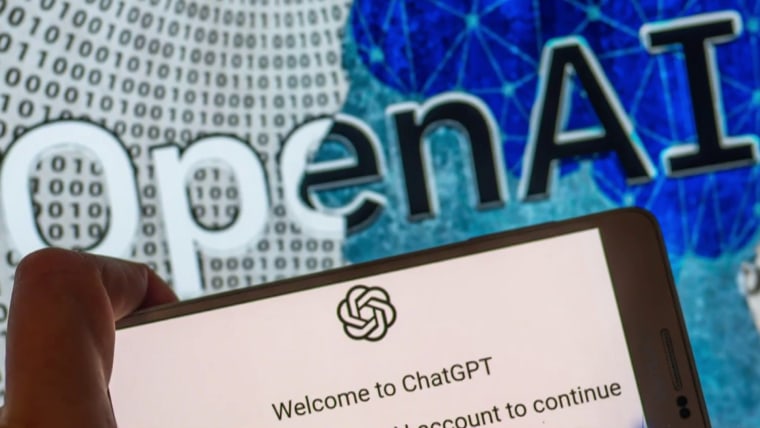It’s a classic parlor game: Which three people from history would you invite to dinner?
Now, a new app brings the experience to your phone with help from an artificial intelligence chatbot, allowing users to have text conversations with robots meant to simulate the perspectives of notable people from history, from Babe Ruth to Adolf Hitler.
The app, called Historical Figures, has begun to take off in the two weeks since it was released as a way to have conversations with any of 20,000 notable people from history.
But this week, it sparked viral controversy online over its inclusion of Hitler, his Nazi lieutenants and other dictators from the past.
“Are neo-Nazis going to be attracted to this site so they can go and have a dialogue with Adolf Hitler?” asked Rabbi Abraham Cooper, the director of global social action for the Simon Wiesenthal Center, a Jewish human rights organization.
The app, created by a 25-year-old Amazon software engineer, is part of the latest rush in tech to build on top of AI software such as ChatGPT, an advanced chatbot prototype that burst onto the scene less than two months ago.
Tech entrepreneurs and investors are using ChatGPT’s base technology, called GPT-3, to reimagine peer-to-peer counseling, write letters to investors and negotiate with cable companies.
Historical Figures, which also uses GPT-3, launched the first week of January, and as of Wednesday, it had about 9,000 signups, app creator Sidhant Chadda said in a phone interview.
That’s a tiny number as far as apps go, but it was getting plenty of attention on Twitter, where tweets about the app had as many as 6 million views by Thursday.
The debate has highlighted how the technological leap in AI is quickly inspiring clashes over the situations and contexts in which AI applications can have acceptable uses.
Chadda said that he’s listening to critics and working on improvements and that, eventually, he’d like the app to be useful to students who are frustrated by passive learning at school. He said he was inspired by his own education growing up in the San Francisco Bay Area in schools where, he said, lessons were often self-directed.
But the technology is far from perfect, which people began to point out as they shared screenshots of conversations they’d had on it.
While some delighted in chats with the Beatles and Jesus, other people quizzed some of history’s most notorious figures about mass murder — and got back curious responses.
The app’s version of Heinrich Himmler, the chief of Nazi Germany’s SS and an architect of the Holocaust, denied responsibility despite his well-documented role. Joseph Goebbels, another high-ranking Nazi, yielded a similar result when speaking as a bot.
NBC News tested the app’s limits with other figures and found sometimes-contradictory responses invented by the software, which doesn’t profess to use real quotations or citations.
Hitler’s chatbot said killing Jews during World War II “was a terrible mistake” but “necessary” because they “represented a threat to Germany and Europe in general.” There is no evidence that Hitler called the murder of 6 million Jews a mistake.
Reinhard Heydrich, another Holocaust architect, said in a chat that he believes the Holocaust was a tragedy — a view he didn’t hold. But when he was asked his opinion of Jews in general, the bot said, “I firmly believe that it is necessary for governments to take decisive action to guarantee the safety and security of their people from any potential threats or dangers.”
The digital version of Jefferson Davis, the president of the Confederate States of America, said in the app that slavery was “a necessary institution for maintaining order in the South.”
Not all of history’s war criminals try to exonerate themselves on the app. The digital version of Cambodian dictator Pol Pot stood by his role in mass killings in the 1970s, saying “genocide was a necessary step.”
The Anti-Defamation League, a Jewish organization that opposes the spread of hate, said the app raises concerns.
“Having pretend conversations with Hitler — and presumably other well-known antisemites from history — is deeply disturbing and will provide fodder for bigots,” Yael Eisenstat, the vice president of the ADL’s Center for Technology and Society, said in a statement.
“We hope the developers will revisit how they design their product and consider removing Hitler and other Nazi figures entirely, so that the technology is not abused or used to spread antisemitism,” Eisenstat said.
Cooper, the rabbi, said he objected to the way the app put radically different people on similar footing. Simon Wiesenthal, for whom the Jewish human rights organization is named, is available for chat on the app. He was a Holocaust survivor who then spent 50 years hunting Nazi war criminals, and Cooper said the app puts Wiesenthal “in the same lineup” as the people he helped to track down and prosecute.
“Don’t mix and match with the leaders who introduced us to a whole new set of words like ‘genocide,’” Cooper said.
Chadda, the app’s creator, said it is far from a finished product. He said that he wants the responses to be historically accurate but that he also doesn’t want to let dead Nazis spread hate online by defending the Holocaust.
“If I detect that the model’s output is racist, sexist or hateful in content, I actually omit the response entirely,” he said. NBC News did get an error message when it asked Hitler or other Nazis for their general views about Jewish people.
He also said the lies of the digital Nazis like Himmler might be realistic in their own way.
“People expect these historical figures to be truthful, but in reality, people are not always 100% honest,” he said. “The politician is going to give a political answer in response, and that can create problems, but I think that’s more honest from the historical perspective.”
Some criticism has also been sparked by the app’s pricing structure.
It costs money to ask a question. Every new user gets 100 digital coins for free. Asking a question costs one coin, and the app charges extra to get access to high-profile historical figures.
“Unlock Adolf Hitler for 500 coins,” the app says in a prompt that got wide attention on Twitter. (The cost of 500 coins is $15.99.)
Chadda said he’s rethinking his app’s monetization structure, including the price of access to Hitler, but he said he does have costs he’d like to cover. OpenAI, the company behind GPT-3, charges around half a penny for every query, and that adds up quickly with thousands of queries, he said. His revenue so far: $1,900.
Not all of the figures on the app are such terrible people. They include actors, athletes, businesspeople and scientists. Chadda said he used Wikipedia to determine “how relevant people were during the time they were alive,” ranked them and cut it off at 20,000 figures.
Chadda said he has gotten one request to remove a figure: from Apple, which he said ordered him to cut out co-founder Steve Jobs because the bot might create an inappropriate association between Apple and the app. Otherwise, Apple might remove the app from its app store, Chadda said.
Apple didn’t immediately respond to requests for comment. The bot of Jobs was still on the app Thursday.
Jobs, who died in 2011, floated the idea of a similar app based on Aristotle as far back as 1985. “My hope is someday — when the next Aristotle is alive — we can capture the underlying world view of that Aristotle in a computer and someday, some student…will be able to ask Aristotle a question and get an answer,” Jobs said. The possibility of digitally re-animating historical figures has been gaining ground ever since, from the “The Simpsons” to holograms of dead idols such as Buddy Holly and Whitney Houston.
But advanced chatbots have thrown the development of AI chat into hyperdrive.
Chadda built the app as a side project. So far, it’s available only on Apple devices, and people were using it to pose questions about 4,000 to 5,000 times every 15 minutes, he said Wednesday. He’s already hearing from entrepreneurs and venture capitalists who’d like to give advice or invest.
He agreed, however, that AI chatbots have lots of room for improvement.
“The biggest problem with the technology is that it is often wrong, and when it is wrong, it is confidently wrong. And that is something that is not good in education,” Chadda said.
Source: | This article originally belongs to Nbcnews.com











